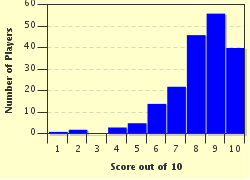Quiz Answer Key and Fun Facts
1. The 1935 version of "Mutiny on the Bounty" won Best Picture, beating off perhaps the best and certainly the most commercially successful collaboration by the immortal Fred Astaire and Ginger Rogers. Which movie was that?
2. The 1937 movie "The Life of Emile Zola" won the Best Picture Oscar ahead of - I won't lie to you - a sparkling comedy starring Cary Grant and Irene Dunne. What was that movie called?
3. 1939's Best Picture Academy Award winner "Gone with the Wind" was one of the century's most watched and anticipated entertainments. But perhaps a musical should have won - one that nearly starred Shirley Temple and Buddy Ebsen, and nearly didn't include its best song. Know the one I mean?
4. "Rebecca" (1940) was the only Alfred Hitchcock movie to win the Academy Award for Best Picture. One picture may have run it close: Hepburn, Grant and Stewart in a comedy about a wedding - not a cheesy movie at all. Can you name it?
5. "How Green Was My Valley" (1941) won Best Picture and Best Director for its experienced auteur, John Ford. It beat an effort by a rookie who produced, wrote, directed and starred in a movie that many consider to be just about the best of all time. Surely you don't need to look into a crystal ball to guess the name?
6. "The Best Years of Our Lives" (1946), with a timely story of returning servicemen, won the Best Picture award ahead of a movie that has become one of Hollywood's most beloved and re-watched, particularly around a certain time of year, with its theme of love, family and optimism beating fear and mistrust. You know the one I mean, yes?
7. The musical "An American in Paris" (1951) took the Best Picture Oscar ahead of which adaptation of a New Orleans-based Tennessee Williams play in which, some say, Marlon Brando reinvented movie acting?
8. "The Greatest Show on Earth" (1952) won Best Picture ahead of which unforgettable Western about a retired lawman with a Quaker wife who has to put his badge back on and stand alone against a gang of killers?
9. Best Picture winner "Lawrence of Arabia" (1962) was a tale told on an epic scale and a real feast for the eyes, but perhaps its style was outweighed by the substance of which adaptation of a novel about racism, hatred and hope in Alabama, with a towering performance by Gregory Peck?
10. "My Fair Lady" (1964) won Best Picture but perhaps it's not flying a kite to suggest that this adaptation of a Broadway show was run close by which Walt Disney classic?
Source: Author
Upstart3
This quiz was reviewed by FunTrivia editor
jmorrow before going online.
Any errors found in FunTrivia content are routinely corrected through our feedback system.

